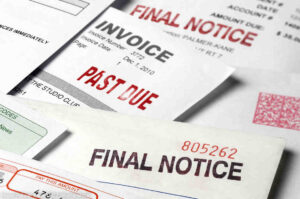By Ben Raab

Each year, thousands of people are subject to debt collection. Sometimes, debtors are subject to unfair, deceptive, or abusive practices by debt collectors. Because consumers do not choose the debt collectors they engage with, consumer protection laws and regulations are particularly important.[1]
To provide consumers with protection, Congress passed the Fair Debt Collection Practices Act (FDCPA). The FDCPA created guidelines under which debt collectors may conduct business and defines rights of consumers involved with debt collectors.[2] Its goals are to eliminate abusive practices in the collection of consumer debts, promote fair debt collection, and provide consumers with an avenue for disputing and obtaining validation of debt information in order to ensure the information’s accuracy.[3]
In 2020, the Consumer Financial Protection Bureau received 82,700 complaints related to the FDCPA.[4] The primary complaint arose from debt collectors attempting to collect debts consumers reported were not owed.[5] In fact, 53 percent of consumers who were contacted about a debt in collection in the past year indicated that the debt was not theirs, was owed by a family member, or was for the wrong amount.[6]
One solution that debt collectors turn to in collecting debts is filing a lawsuit. About 15 percent of consumers who are contacted about a debt in collection will be sued over that debt.[7] However, the Federal Trade Commission (FTC) has concluded that litigation does not provide adequate protection for consumers.[8] The FTC has determined that “the system for resolving disputes about consumer debts is broken.”[9]
Concerns related to litigation include: “(1) filing suits based on insufficient evidence; (2) failing to properly notify consumers of suits; (3) the high prevalence of default judgements; (4) improperly garnishing exempt funds from bank accounts; and (5) suing or threatening to sue on time-barred debts.”[10] It is estimated that between sixty percent and ninety-five percent of consumer debt collection lawsuits result in a default.[11] Given how few consumers appear in litigation and the risk of adverse consequences from not appearing, the public would benefit from efforts to increase consumer participation in debt collection litigation.
Legislative efforts have been taken to address debt collection issues. Recently, the U.S. House of Representatives passed a bill that would require a debt collector to provide advance notice to a consumer of the intent to take legal action to collect a debt.[12] While this bill would help ease concerns related to litigation, it has not yet received any action in the U.S. Senate.[13] The bill will not likely be considered by the Senate prior to the end of the current session. While this bill would attempt to solve the litigation issue at the federal level, the FTC believes the issue should be solved at the state level.[14]
Some states have strong debt collection laws, whereas other states have virtually none. Virginia has no law comparable to the FDCPA; however, efforts have previously been taken to pass such a law.[15] One state with particularly strong debt collection laws is North Carolina. The North Carolina laws expand both the definition of consumer and debt collector to encompass more entities, granting more protection to people who otherwise would have very little.[16] For example, the FDCPA does not cover a creditor who is collecting on their own behalf, whereas the North Carolina law would apply. Passing laws similar to North Carolina’s would go a long way in easing the burden of many people who constantly deal with debt collectors.
[1]Cheryl Cooper, Cong. Rsch. Serv., IN11678, House Passes the Comprehensive Debt Collection Improvement Act (H.R. 2547) 1-2 (2021).
[2]See Fair Debt Collections Practices Act, 15 U.S.C. § 1692.
[3]15 U.S.C. § 1692.
[4]Sebastian West, Benign Language on Letters from Debt Collectors and Avoiding Violations of the Fair Debt Collection Practices Act, 90 U. Cin. L. Rev. 970, 970 (2022).
[5]Id.
[6]Consumer Financial Protection Bureau, Consumer Experiences with Debt Collection: Findings from the CFPB’s Survey of Consumer Views on Debt 5 (Jan. 2017).
[7]Id.
[8]Fed. Trade Comm’n, Repairing a Broken System: Protecting Consumers in Debt Collection Litigation and Arbitration i (2010).
[9]Id.
[10]Id. at ii.
[11]Id. at 7.
[12]See Comprehensive Debt Collection Improvement Act, H.R. 2547, 117th Cong. (2021).
[13]H.R. 2547 Comprehensive Debt Collection Improvement Act, Congress.gov, https://www.congress.gov/bill/117th-congress/house-bill/2547.
[14]Supra note 9, at 10.
[15]See H.D. 443, 2012 Gen. Assemb., Reg. Sess. (Va. 2012).
[16]See N.C. Gen. Stat. §§ 58-70-1 to -155; N.C. Gen. Stat. §§ 75-50 to 56.

